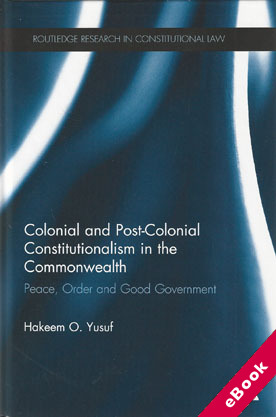
The device(s) you use to access the eBook content must be authorized with an Adobe ID before you download the product otherwise it will fail to register correctly.
For further information see https://www.wildy.com/ebook-formats
Once the order is confirmed an automated e-mail will be sent to you to allow you to download the eBook.
All eBooks are supplied firm sale and cannot be returned. If you believe there is a fault with your eBook then contact us on ebooks@wildy.com and we will help in resolving the issue. This does not affect your statutory rights.
The peace, order and good government (POGG) clause is found in the constitutions of almost all Commonwealth countries. Since its introduction, the clause has played a significant role in colonial and post-colonial constitutionalism in Commonwealth jurisdictions.
This book is the first full length analysis of the various dimensions of the peace, order and good government clause. It argues that the origins of the POGG clause mark it out as an anachronistic feature of British constitutionalism when seen against a modern setting of human rights, liberty and democratisation.
The book traces the history, politics and applications of the clause through the colonial period in Commonwealth territories to date. It provides critical evaluation of the POGG clause in a cross-continental enquiry, examining statutory, political and constitutional deployment in Australia, Canada, India, Nigeria, South Africa and the United Kingdom.
The evaluation demonstrates that the POGG clause has relevance in a number of significant aspects of legal and socio-political ordering across the Commonwealth featuring prominently in the federalism question, emergency powers and the review of administrative powers. It maintains that while the clause is not entirely devoid of positive value, the POGG clause has been used not only to further the objects of colonialism, but also authoritarianism and apartheid.
This book calls for a rethink of the prevailing subjective approach to the interpretation of the clause. The book will be of interest to students and academics of public law, human rights law, and comparative politics.